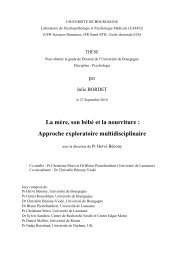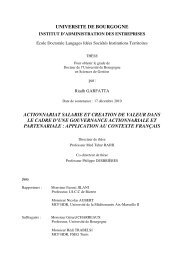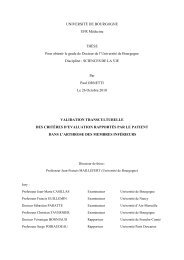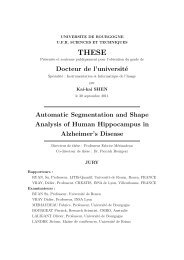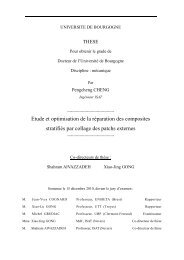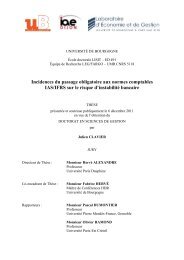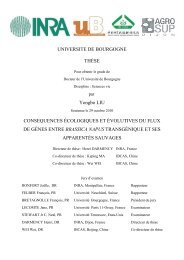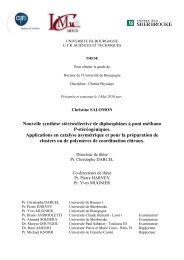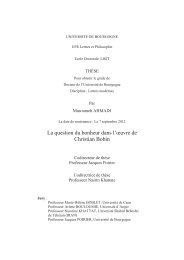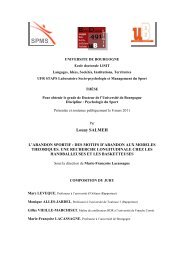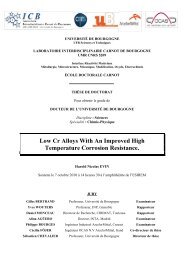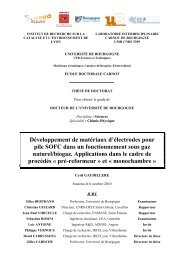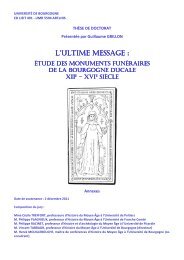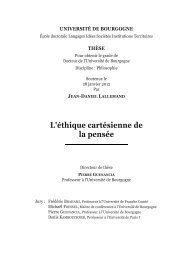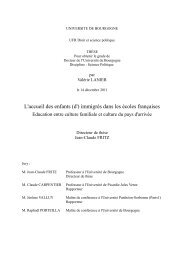Higher education in Asian countries and the role of international ...
Higher education in Asian countries and the role of international ...
Higher education in Asian countries and the role of international ...
Create successful ePaper yourself
Turn your PDF publications into a flip-book with our unique Google optimized e-Paper software.
21<br />
Christopher Steven Coll<strong>in</strong> (2009) has studied <strong>the</strong> <strong>role</strong> <strong>of</strong> <strong>the</strong> World Bank <strong>in</strong> higher <strong>education</strong> <strong>in</strong><br />
two <strong>countries</strong>: Ug<strong>and</strong>a <strong>and</strong> Thail<strong>and</strong>. He found that dur<strong>in</strong>g past thirty years <strong>the</strong>re is a positive<br />
shift <strong>in</strong> lend<strong>in</strong>g for <strong>education</strong> (Coll<strong>in</strong>, 2009). Keohane studied how <strong>in</strong>ternational <strong>in</strong>stitutions<br />
work, <strong>and</strong> transform. He made critical comparison <strong>of</strong> rationalistic <strong>and</strong> reflective view (Keohane,<br />
1988). Mart<strong>in</strong> <strong>and</strong> Simmons had also found that most <strong>of</strong> <strong>the</strong> research conducted on <strong>in</strong>ternational<br />
organizations is <strong>the</strong>oretical work or qualitative case studies <strong>and</strong> rare work exist on <strong>the</strong>ir <strong>role</strong><br />
(Mart<strong>in</strong> & Simmons, 1998). M<strong>in</strong>gat (2007) has studied <strong>the</strong> variation <strong>in</strong> <strong>the</strong> distribution <strong>of</strong><br />
resources <strong>and</strong> outcomes across different <strong>countries</strong> (M<strong>in</strong>gat, 2007). Tilak has studied <strong>the</strong><br />
f<strong>in</strong>anc<strong>in</strong>g <strong>of</strong> <strong>education</strong> for development <strong>in</strong> <strong>Asian</strong> region. Accord<strong>in</strong>g to him “<strong>in</strong>ternational aid –<br />
loans <strong>and</strong> grants, both bilateral <strong>and</strong> multilateral, has been an important source <strong>of</strong> f<strong>in</strong>anc<strong>in</strong>g<br />
<strong>education</strong> <strong>in</strong> some <strong>of</strong> <strong>the</strong> <strong>Asian</strong> <strong>countries</strong>: almost all low <strong>in</strong>come <strong>countries</strong> <strong>in</strong> <strong>the</strong> region receive<br />
small to significant amounts <strong>of</strong> external aid for development <strong>of</strong> <strong>education</strong>” (Tilak J. B., 2010).<br />
2.2 IGOs’ importance <strong>in</strong> <strong>the</strong> society<br />
Realist, liberal, idealist <strong>and</strong> <strong>in</strong>stitutionalist schools have long debated <strong>the</strong> utility <strong>of</strong> IGOs <strong>and</strong> a<br />
majority accepts that IGOs have special <strong>role</strong>s to play <strong>in</strong> <strong>the</strong> society but no consensus exist on<br />
what extent IGOs can/ should <strong>in</strong>fluence <strong>the</strong> states (Boehmer, Gartzke, & Nordstrom, 2004).<br />
Whereas constructivists, functionalists, <strong>and</strong> <strong>in</strong>stitutionalists are <strong>of</strong> <strong>the</strong> op<strong>in</strong>ion that regimes <strong>and</strong><br />
<strong>in</strong>ternational <strong>in</strong>stitutions play a pivotal <strong>role</strong> foster<strong>in</strong>g cooperation, promot<strong>in</strong>g common norms,<br />
reduc<strong>in</strong>g conflicts <strong>and</strong> confrontations (Young, 1992). It is also evident that for <strong>the</strong> last few<br />
decades, IGOs have become dynamic players <strong>in</strong> <strong>the</strong> world <strong>of</strong> politics <strong>and</strong> have <strong>in</strong>creased <strong>the</strong>ir<br />
<strong>in</strong>fluence as well. Due to <strong>the</strong> enhanced <strong>role</strong> <strong>of</strong> <strong>the</strong>se <strong>in</strong>ternational bodies, now it is believed that<br />
IGOs matter <strong>and</strong> <strong>the</strong>y have become a complimentary component <strong>of</strong> <strong>the</strong> world order (Boehmer,<br />
Gartzke, & Nordstrom, 2004).<br />
IGOs are cont<strong>in</strong>uous <strong>in</strong>ternational actors as well as <strong>in</strong>strument <strong>of</strong> <strong>the</strong> state <strong>in</strong> support<strong>in</strong>g higher<br />
<strong>education</strong> for social <strong>and</strong> economic development through <strong>in</strong>ternational underst<strong>and</strong><strong>in</strong>g, cooperation<br />
<strong>and</strong> collaboration. Different concepts <strong>of</strong> IGOs function<strong>in</strong>g can be summarized as: IGOs as<br />
political tool <strong>of</strong> state diplomacy; as arena for coord<strong>in</strong>ation <strong>and</strong> negotiation; as cooperative<br />
agents; <strong>and</strong> as bureaucratic bodies (Amaral, 2010), (Barnett & Press, 2004).<br />
IGOs are owned, designed, created, constructed, managed, resourced, advanced, protected <strong>and</strong><br />
defended by states. These organization are nei<strong>the</strong>r hollow vessels nor useless entities but an



